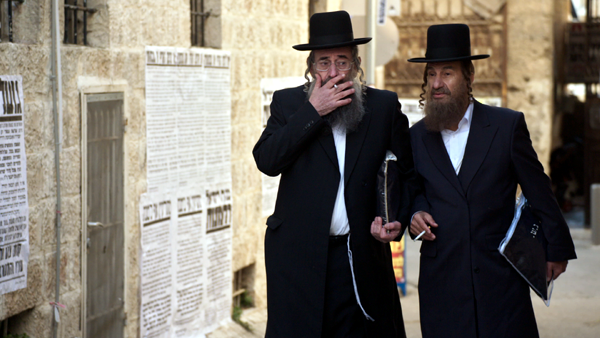Shtisel
Subject: Shtisel

I'm engrossed in the film Shtisel. I find it a fascinating watch whilst at the same time, disturbing.
The story is set in an ultra Orthodox Jewish community and amplifies the mental internment of people who dedicate themselves to an interpretation of religion. The community is rich in character, characters who's strict observance of the Talmud make them supremacy confident in their destiny. The film portrays the rigour and surety of living in such a community.
Human beings born into communities, for good or evil soak up the current practices of that community, its styles and the ever changing norms of practice, the ins and outs of fashion.
In the world of the ultra Orthodox Jew there are no fashions there are no changing norms only the truth as obtained by reading and reciting the Torah. This psychological disconnect from the world around them, the word of God speaking from the pages, determining their every action has a profound effect on the mind. The character of the people are set biblically in a period when men and women were defined differently and the role each person played was settled beyond dispute.
The film series depicts the pressure on a father, a Rabi who's son, also a Rabi, is induced to follow the normal matchmaking tradition of having a wife selected for him. Unfortunately he finds himself besotted by the image of a woman who is married and struggling, her husband having left to find his fortune in another country and it's this emotional dispute which provides the backdrop to the story.
The complexity of a patriarchal led family, made more so by the patriarchs total subservience to biblical scholarship and a mode of dress and living which leaves no doubt as to their position in society plus the conflicting role of the mother dealing with the practicalities of life whilst men talk in biblical riddles.
I'm reminded of the Jewish comedians who used to have a retort for everything. These men talk in preprepared assumptions, of argument and discussion preset in their brains are not the response of a free mind. This paradox, the surety that you get when you take your answers from a biblical text, itself is based on a world far removed from our own, has an allure but is bound to shake the presumptions of a father who loves his son but is in direct conflict with the way his fellow Rabbi will judge him.
The position of women is a poignant juxtaposition of what we are used to in the 21st century. Apparently subservient and yet wielding a great power in the home they are left to get on with raising the family but always under the strict testament of a faith bound by the innumerable rules which both define men and women. Helplessly they must as mothers find ways of imposing their will on the patriarch, he totally dependent on his biblical status, she on her undying love of her children.
Reading the media releases' the series is an accurate depiction of an Orthodox community in Jerusalem. Set in Hebrew I am fascinated by the ritual, the tapping of the scroll, a Mezuzah attached to the right hand door frame as you enter a house, the ritualistic prayers which are appropriate on eating and drinking and the almost medieval majesty as they go about their mystical business.
It's well worth watching

No comments:
Post a Comment